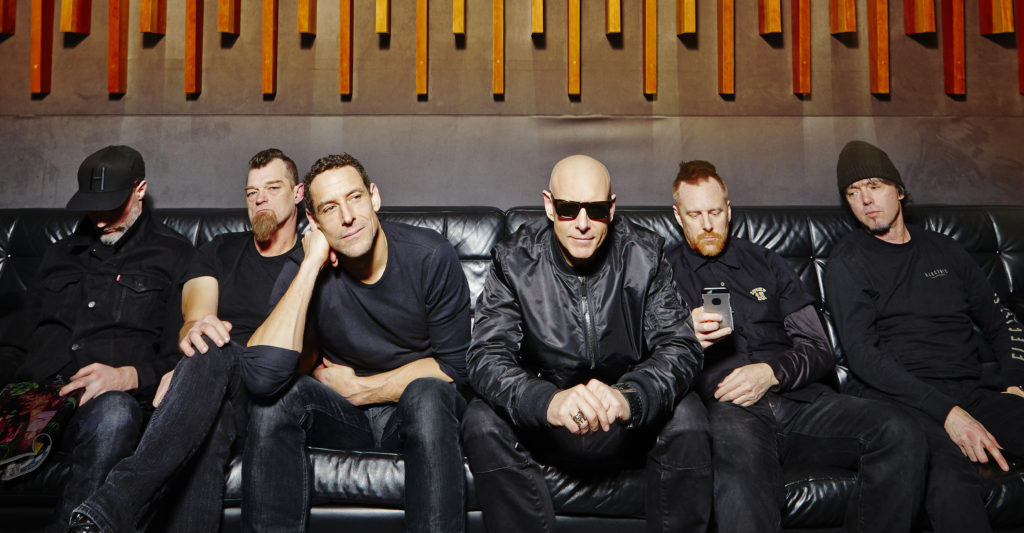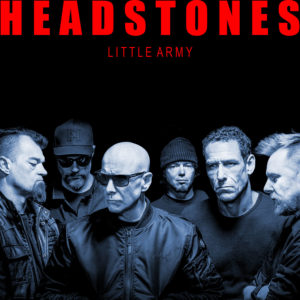
Canadian punk/alternative rock legends The Headstones put out new music when they want, how they want, where they want and for damn good reasons. It’s been that way since lead vocalist, primary songwriter and bulls***t-free musical philosopher Hugh Dillon began collaborating with long-time bandmates Tim White (drums) and guitarist Trent Carr back in the late 1980s in the Limestone City of Kingston, Ontario.
Defying convention, steadfast in their collective musical vision, kowtowing to none, and always in-your-face with their unique and incendiary brand of rock music, from the band’s platinum-selling debut album Picture of Health through the impending June 2 issuance of their new record Little Army, The Headstones have always told it like it is – usually quite loudly, and laced with a potent blend of intelligence and raw invective.
Little Army is the band’s first studio album of new material since Love + Fury, which came out in 2013, not long after the band reunited after a 10-year break. It was released on the new Cadence Music Group label, an agglomeration of Canadian independent labels and publishers that includes the former MapleMusic, Fontana North and Open Road Recordings brands, among others.
“Why I loved this label was these people care. They listened to the demos closely. It was like the old days, and listen, I have nothing against the labels from the old days. They went to bat for us; they did what they did, there were good people in the business who really gave a shit about us back then. These new guys came to the live show, they had fucking opinions of the songs, they had opinions on the demos. Ian Taylor, who runs Cadence, filled in on drums for the song Devil’s On Fire when our drummer was late and he did because he said he loved that fucking song,” Dillon said.
“So you’re seeing the president of the record company not sitting back in some back room somewhere watch from afar getting his minions to do shit. You’re seeing people roll up their sleeves and express their fucking love for rock and roll and what it takes to be here and stay here and be planning and competing in this day and age.”
What compelled Dillon, White, Carr and more recent band members Steve Carr and Rickferd Van Dyk to record a new album was simply the artistic impulse.
“We had these songs and the record company said they were great songs, and that they wanted to give us a deal so we can get them out there. People can’t just say, ‘hey, great we’re putting out a record’ when it’s a piece of shit and it’s driven by pointlessness. It has to mean something in this day and age for it to cut through so anyone hears it. And these songs had that because there was an authenticity to the music and producer Chris Osti brought a lot to it as well,” Dillon said.
“And part of it is once I get going writing songs I get to have the camaraderie of the other people in this band, who are all artists in their own right. If you have great people around you, then life is exceptional and I have just been very fortunate to have these great people and these great working relationships.
“Ultimately, it all comes down to songwriting. This is a craft and I have been lucky enough to develop it over the years and to exercise it too. And I want to make sure you understand what triggers this; it isn’t anything but pure art and honesty – that’s what it comes down to. And I am lucky that I get to work with such great musicians. Trent and I have been friends and in bands together for years. Tim and I have been playing together for a lot time too, and those two have been friends since 1972 so when guys like us get together, there’s a king of shorthand between us that makes the process work so efficiently. And it also means that we want to make something that’s important and has to do with life.”
Dillon is effusive of his praise for his formative years as a musician and songwriter in the Kingston of the 1980s – an environment that spawned The Tragically Hip and would also spawn Moist, Sarah Harmer, and more recently The Glorious Sons. His love for his hometown has resulted in the song Kingston, a rough-and-tumble, yet affectionate look at the wondrous characters and gritty establishments that would help forge The Headstones attitude and sound.
“That song just means the world to me and it’s interesting because it’s about my hometown and all the guys from there that I have known for so long, and yet Trent and I were at my home in Los Angeles when we wrote it. And Trent knows my whole story of course; Kingston is where it all started for me and it started from us just talking about that one day and those conversations got me thinking about the truth of who I am and who we are – there has to be truth behind it or what’s the fucking point,” Dillon explained.
“You do need a reason to write something – I know I do. Being away from home for so long and realizing that everything I learned about writing songs and being an artist came from Kingston. I remember going to the Prince George Hotel, that’s where I would see these great bands and I was to great blues music there and the guys that I would be drinking and hanging out with would be guys like Gord Downie. And we all had this love for true rock and roll music. We got to meet people like Luther ‘Guitar Junior’ Johnson and I did get to smoke pot with him in a corn cob pipe. And then later on in my life my partners in crime, who ended up being in this great band called The Hip and they’re still my friends to this day.
“And the reason I am making music and doing any of this is because long, long ago, Paul Langlois and Gord Downie came to support our band in Toronto upstairs at The Ultrasound and people saw that; record company people saw that and all of sudden they take notice of this other band from Kingston because Gord and Paul are there. And they can track that back to me playing hockey with Paul when we were 10 and our band’s manager, Bernie Breen, played on the same team. Gord and I were in the same class in high school. It’s because of those connections and those funny series of events that have created this kind of art that I am interested in making. It’s more than just created a great riff, there’s got to be a real, honest story and a reason to do the song.”
 The world outside of the band and outside of Dillon’s remarkably successful, diverse and prodigious acting career isn’t any better than it was when The Headstones were confronting the lunacy, dishonesty and fakery of life back in the 1990s. If anything, thanks to the proliferation of social media, ‘fake news’ and growing tribalism and intolerance, things are getting worse – or better, in terms of fodder for material.
The world outside of the band and outside of Dillon’s remarkably successful, diverse and prodigious acting career isn’t any better than it was when The Headstones were confronting the lunacy, dishonesty and fakery of life back in the 1990s. If anything, thanks to the proliferation of social media, ‘fake news’ and growing tribalism and intolerance, things are getting worse – or better, in terms of fodder for material.
And The Headstones are there to spit right back in the face of the worst offenders with the best weapon they have – the blunt, unfiltered truth.
“The world is just as stupid and corrupt. It is, and that’s life. And the thing that’s great is, when I am acting, I am paid to play other people and someone gives me the words to say and the director tells me how to say them. And even in life, so much living your life is about, ‘well, you don’t want to rock the boat,’ and you know it’s all bullshit. If you don’t express how you really feel, you’re going to go crazy, and you need to be able to express the full gamut of emotions. People are sometimes afraid to be forthright and forceful because they don’t want to offend, but they end up stuffing their feelings deep inside and then wonder why they have a fucking ulcer. I realized a long time ago, when I cleaned up my life, if I’m not 100 per cent honest, I’m screwed,” Dillon said.
“If I am fucking honest, then I am free to do whatever I want, including choosing where I want to go and who I want to hang around with and what artistic projects I want to get involved with. If you’re not doing it that way then you’re already starting down that road to compromise and all that’s going to do is make you resentful. If the writing wasn’t expressing real feelings, then everything is fucking fraudulent. If what you’re putting out there is authentic, then it’s going to be good.”
Continuing with the intimate connection with The Tragically Hip, Little Army was recorded at The Bathouse Studio near Kingston, the Hip-owned facility, with Dillon’s long-time producer Chris Osti handing producing chores alongside The Bathouse’s in-house engineering wizard Nyles Spencer.
“There was a joy in making this record and sometimes things just happen at the right time for the right reasons. Things just lined up and that included being able to go back to the Bathouse and work there, which is where a lot of that joy came from. And Nyles Spencer is really like another producer because this guy cares so much about the music and the songwriting and craft of making these songs and making them great. He brought so much to the project too. I trusted that guy implicitly and I just love that studio. I will never make another record anywhere else but there,” he said.
Dillon said the band has a few dates planned for over the summer, including at The Velvet Underground In Toronto on June 2 for an album release party, on July 14 at Ottawa Bluesfest, and Aug. 12 at the Kee to Bala, and will do a more extensive Canadian tour in the fall.
In the interim, you can find out more about The Headstones, Little Army and upcoming tour dates at www.headstonesband.com.
- Jim Barber is a veteran award-winning journalist and author based in Napanee, ON, who has been writing about music and musicians for a quarter of a century. Besides his journalistic endeavours, he now works as a communications and marketing specialist. Contact him at jimbarberwritingservices@gmail.com.
https://www.youtube.com/watch?v=VclaeaajDiU
SHARE THIS POST: